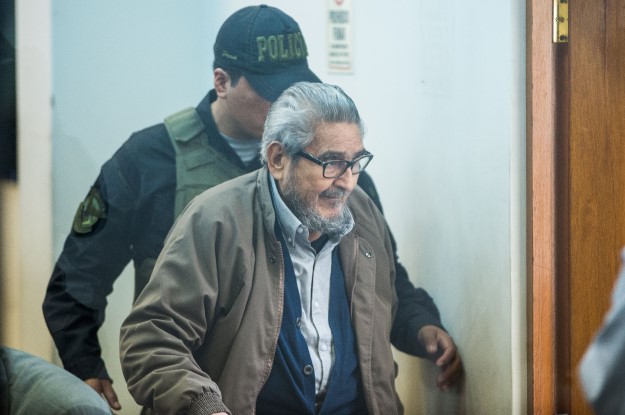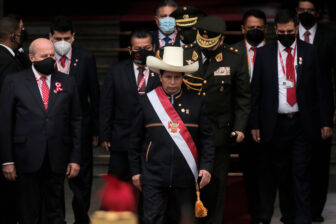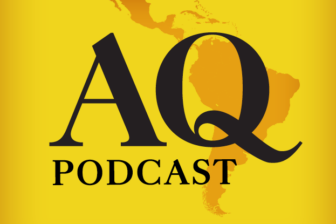LIMA – The victory of Peruvian President Pedro Castillo, in office for a little over a month, has been said to represent a major shift in Peruvian politics. This is the first time in the country’s history that a member of a Marxist-Leninist party has been democratically elected. That is no small feat, considering that much of the left’s role in recent Peruvian history has been marked by the violence and trauma resulting from the activity of a Maoist terrorist organization, the Shining Path, in the 1980s and ’90s. The issue of terrorism has never ceased to be a divisive, hot-button topic in Peru. The right in particular has used the painful memory of the Shining Path and its extremist ideology to delegitimize any policies proposed by leftist parties, including moderate ones, over the past thirty years.
This fraught history explains why there was such shock over Castillo’s government’s association with MOVADEF, a political organization created in 2009 with the purpose of seeking amnesty for former Shining Path members (including its leader, Abimael Guzmán), and registering the organization as a political party. During the presidential campaign, the press had reported that Castillo was close to individuals linked to MOVADEF through the teacher’s union he spearheads, FENATEP. Castillo further increased suspicions by naming as prime minister Guido Bellido, who had expressed sympathy towards Shining Path in the past. Iber Maraví, Castillo’s minister of labor, has also been identified by former terrorists as a participant in the group’s activities during his youth, according to police reports. Maraví has stated that these are false accusations. The president has not made any gestures to indicate his repudiation of these individuals, nor has he removed the ministers from their positions, despite calls to do so.
As expected, the right and center right have seized on these links to make the case that Pedro Castillo is a danger to Peruvian democracy and that he himself might be a Shining Path sympathizer. While Castillo denies these accusations, his behavior has certainly increased the fragility of an already weak presidency, haunted by the possibility of an impeachment process from an opposition-controlled Congress.
Abimael Guzmán’s sudden death last Saturday, however, presents a twist that is likely to work in Castillo’s favor. The 86-year-old leader of one of the bloodiest insurgencies in Latin America, known by his fanatical followers as “President Gonzalo,” died after almost 30 years of incarceration following his capture in 1992. Castillo immediately seized the opportunity, via Twitter, to emphatically condemn the Shining Path and Guzmán, calling him “responsible for the loss of innumerable lives of our compatriots” and insisting, “Our position of condemnation of terrorism is firm.” Castillo’s economy minister, Pedro Francke, added, “We will not forget the horror of that era, and [Guzmán’s] death will not erase his crimes.”
As a result of its extremely hierarchical structure, Shining Path had crumbled after Guzman’s arrest. Some of its remnants turned to drug trafficking in parts of Peru’s Amazonian region. Others, like MOVADEF, chose to keep following “Gonzalo Thought” — Guzmán’s interpretation of Marxism — and pursued amnesty for Shining Path members through legal channels, such as participation in the political process. Guzmán might have been in prison, but he remained an important, albeit despicable, figure in Peruvian politics. To be associated with him or with Shining Path in any capacity was an indelible stain which only those on the furthest edges of the far left dared to accept openly.
His death could change the climate around the legacy of the Shining Path in two major ways. First, it leaves MOVADEF without its main objective: Guzmán’s amnesty and release. Other members of Shining Path’s leadership, like Guzmán’s wife and second in command, Elena Iparraguirre, remain in prison — but Guzmán was indisputably the central figure to his Maoist militants. And second, it appears a significant part of the population is weary of the accusations of terrorism (terruqueo) that the right has so often thrown around in the past decades, and wishes to leave behind the bloodiest chapter of Peruvian history.
For example, according to a poll carried out by Ipsos right before Guzmán’s passing, 33% of those polled say Bellido’s past comments and photos on his social media do not reflect sympathy for Shining Path. In fact, Bellido’s approval rating, while still low, has increased slightly, from 21% to 25%, and 28% think he should continue as prime minister. Of those surveyed, 30% believe the accusations that Iber Maraví belonged to the terrorist group are part of a plot against the government. Castillo’s approval rating, meanwhile, has also increased slightly, from 38% to 42%.
Clearly, for a majority of Peruvians, Castillo’s links to MOVADEF are unacceptable and a reason to be wary of his government. But the numbers also show that about a third of the population either does not care or does not believe that those links are a cause for concern, quite likely due to people’s distrust of a right and center-right that have not managed to offer a popular political alternative, and of a media establishment that during the campaign was biased towards Castillo’s rival, Keiko Fujimori. It is possible that the death of Guzmán will further distance the Shining Path’s violent legacy from people’s memory, as well as its association with Castillo’s government. Since Saturday, the president has already publicly condemned the group in statements and rallies.
And yet, Castillo’s presidency is not out of danger. The president still faces an opposition that is on the lookout for the first viable opportunity to remove him, as well as internal struggles between moderates and radicals that threaten to undermine his stability. However, it’s only been six weeks since Castillo was sworn in. In a country full of cinematic twists, it’s hard to predict what the next six weeks will bring.









